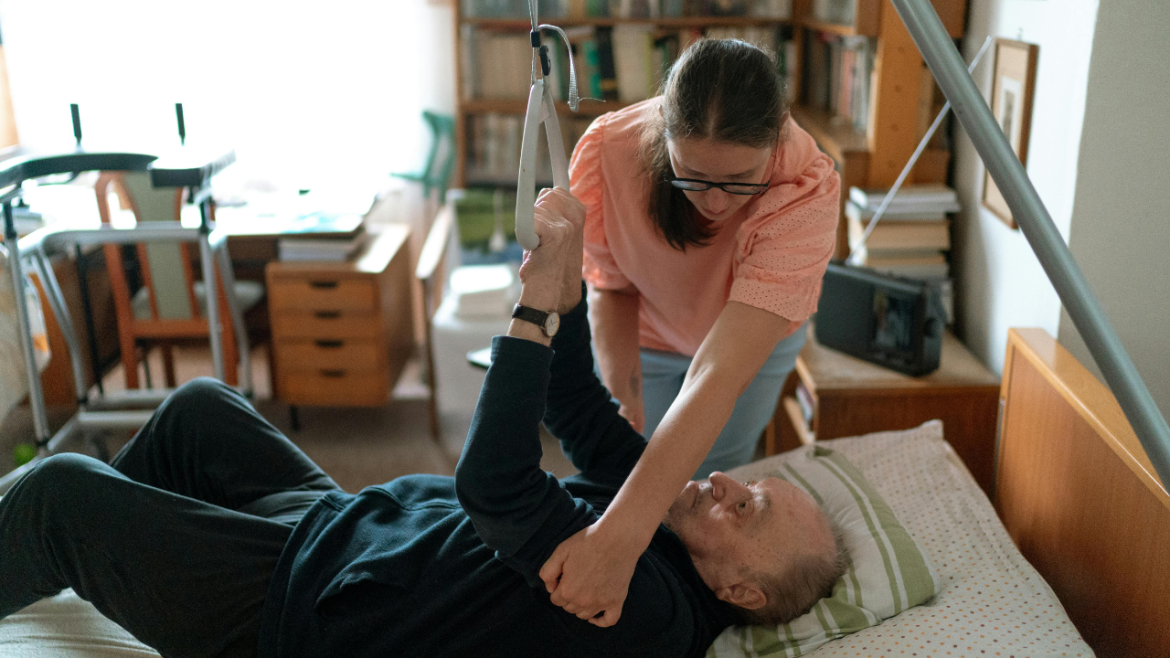Did you know that Leading Edge Senior Care has a Dementia Support Group? We meet monthly In Mesa. For more details <click here>
How To Help A Bedbound Senior
Caring for a bedbound senior is an act of deep compassion, patience, and emotional strength. When a loved one loses mobility, it doesn’t just alter their physical reality—it transforms their entire way of life. The bed becomes their world.
As caregivers, it becomes our responsibility to make that world safe, dignified, and filled with care. Understanding how to help a bedbound senior involves more than just physical support—it demands emotional presence, consistency, and intentional actions that honor their humanity.
Understanding the Challenges of Being Bedbound
For many seniors, being confined to bed is not just a medical condition but a profound emotional adjustment. The inability to move independently may lead to feelings of helplessness or depression. It’s not uncommon for seniors in this situation to experience anxiety, especially if they once led active lifestyles.
Physically, being bedbound increases the risk of complications such as pressure sores, urinary tract infections, respiratory issues, and muscle atrophy. But the emotional consequences, including isolation and disconnection from daily routines, can be just as severe.
Acknowledging these challenges is essential before taking any steps forward. This understanding sets the tone for a compassionate, tailored approach to care—one that encompasses both the body and the spirit.
Creating a Comfortable and Safe Bed Environment
The bed itself must become a sanctuary of comfort and safety. Investing in the right mattress can significantly reduce the risk of pressure sores. Alternating pressure or memory foam mattresses are often recommended, as they promote better circulation and minimize skin breakdown. Keep the bedding clean, dry, and wrinkle-free to prevent irritation.
Positioning plays a critical role. Repositioning the senior every two hours helps relieve pressure and promotes circulation. Pillows and wedges can support limbs and reduce the strain on joints. Keep personal items within easy reach—such as tissues, water, the call button, or a book—to help them retain a sense of independence, even in small ways.
Soft lighting, soothing colors, and personal touches like family photos can also enhance the atmosphere and bring comfort to their day.
Prioritizing Skin Care and Hygiene
Daily hygiene for a bedbound senior is not only necessary for health but also for preserving dignity. Skin becomes fragile over time, and neglect can lead to serious infections. Use gentle cleansers and moisturizers to keep skin clean and hydrated. Pay special attention to folds of skin, under the arms, and around pressure points.
Bathing can be done in bed with a basin, warm water, and mild soap. A shower cap with built-in shampoo is a simple way to clean hair without needing a full wash. Don’t underestimate the emotional impact of feeling fresh and clean—it can lift their spirits more than we often realize.
Changing adult briefs frequently and checking for signs of skin irritation are important in preventing sores and infections. Apply barrier creams as recommended by healthcare professionals.
Encouraging Mental Engagement and Emotional Connection
Just because a senior is bedbound doesn’t mean their mind has stopped seeking stimulation. Human connection and mental engagement remain vital. Encourage daily conversations, play music they enjoy, or read to them. Memory games, photo albums, or even phone calls from relatives can brighten their mood and foster a sense of belonging.
Being present emotionally—through a gentle touch or shared silence—can be profoundly reassuring. It tells them they’re not alone, even in the quietest moments. You may not always have the right words, but your presence can speak volumes.
Maintaining Nutrition and Monitoring Medical Needs
Proper nutrition is vital for healing, maintaining strength, and boosting immune function. Work with healthcare providers to ensure meals are balanced and easy to digest. Sometimes, seniors may experience reduced appetite or difficulty swallowing, so meals may need to be pureed or supplemented.
Hydration should never be overlooked. Offer fluids regularly, and consider thickening agents if swallowing is an issue. Monitor their weight, track any changes in appetite, and be vigilant about medication schedules.
Equally important is keeping up with medical appointments. If the senior can’t travel, explore in-home visits or telehealth options. A team approach involving doctors, nurses, and physical therapists can provide a more comprehensive care plan.
The Power of Patience, Love, and Consistency
Helping a bedbound senior means showing up consistently, both physically and emotionally. The smallest routines—adjusting a blanket, offering a smile, or brushing their hair—become the heartbeat of their day. While it may be exhausting at times, the role of a caregiver is one of life’s greatest expressions of love.
This journey can be challenging, but it is also deeply meaningful. By giving our time, attention, and care, we don’t just support their body—we nurture their soul. Even in stillness, life remains full of connection, dignity, and purpose.

